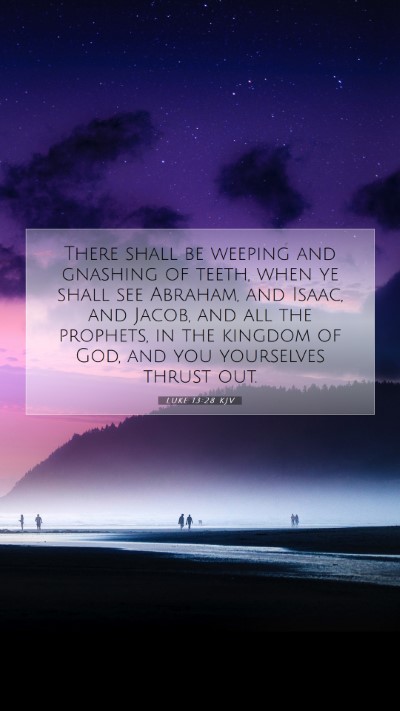Bible Verse Commentary: Luke 13:28
Verse Reference: Luke 13:28 - "There will be weeping and gnashing of teeth, when you see Abraham and Isaac and Jacob and all the prophets in the kingdom of God, but you yourselves thrown out."
Understanding the Verse
This verse from the Gospel of Luke presents a stark portrayal of judgment and exclusion. Jesus uses powerful imagery of sorrow and regret to emphasize the consequences of rejecting God's kingdom.
Bible Verse Meaning
This passage conveys critical themes of rejection, judgment, and the realization of lost opportunities. When reflecting on Luke 13:28, it's essential to consider the socio-religious context of Jesus' audience—Jewish individuals who presumed their place in God's favor based on lineage and heritage.
Insights from Commentaries
- Matthew Henry: Henry highlights the pain of exclusion from the pleasing communion with the patriarchs which contrasts the eternal joy of the kingdom of God. The weeping signifies regret upon witnessing the privilege of others while being denied entry due to their own unbelief and negligence.
- Albert Barnes: Barnes notes the strong warning embedded in this verse about the perils of relying solely on one's ethnicity or religious background without genuine faith and obedience. He stresses that personal conviction and faith are what determine an individual’s access to the kingdom.
- Adam Clarke: Clarke elaborates on the metaphorical significance of 'weeping and gnashing of teeth'. This represents deep emotional distress and the realization of missed opportunities for repentance and faith, highlighting the finality of judgment for those who do not accept the invitation into the kingdom.
Practical Applications
Understanding Luke 13:28 urges believers to reflect on their own faith journey:
- Self-Reflection: Assess your relationship with God and confirm that it is built on faith and obedience, rather than mere tradition.
- Evangelism: Share the message about the importance of personal faith with others who might presume their status in God's kingdom based on heritage.
- Preparation: Encourage humility and diligence in spiritual growth, recognizing that the kingdom is accessible to all, but requires sincere commitment.
Cross References
- Matthew 8:11-12 - Highlights the entrance of the faithful from outside Israel into the kingdom.
- Revelation 21:27 - Speaks of those who cannot enter; reinforcing the exclusivity of the kingdom.
- Luke 16:26 - Describes the inability to cross from one realm to another after judgment.
- Matthew 7:13-14 - Contrasts the narrow gate that leads to life against the broad way leading to destruction.
- Luke 12:46 - Discusses the fate of unfaithful servants who are put out where there is weeping.
Conclusion
Luke 13:28 serves as a powerful reminder of the seriousness of our spiritual commitments and the reality of divine judgment. As believers in Christ, it encourages us to engage in Bible study insights and Biblical exegesis to better understand the message of the Gospel and to remain vigilant in our walk with God.
Understanding Scripture, especially challenging verses like this, is essential for anyone involved in Bible study groups or online Bible study. Utilizing Bible study tools can enrich one's grasp of these vital truths and enhance practical application in daily life.


